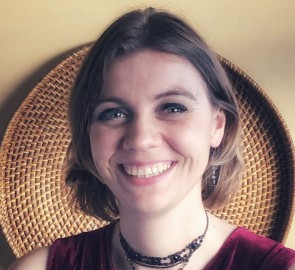Malany's story

Phenylketonuria (PKU) is a rare metabolic disease that is picked up at birth. If you have a child and can remember the heel prick test that is completed within a few days of giving birth - one of the things the test checks for is what I have!
If not picked up at birth and treatment then started, PKU can cause severe mental disability. Normal milestones won't be reached, and the brain damage can be irreversible. Luckily, there is a treatment available; each child with PKU is followed by an amazing Metabolic Team and a diet-for-life begins.
As a person with PKU, my liver is unable to break down a specific amino acid in protein, called Phenylalanine, and so the resulting treatment for me is strictly 11 grams of natural protein per day with the remainder of my nutritional needs being met with a special medical formula or food supplement.
My diet is actually considered quite liberal for someone with PKU, others with my condition can only have two or four grams. To put this into perspective, your average egg contains six to eight grams of protein - in other words, many people with PKU can't even have eggs on toast for breakfast, let alone scramble the eggs with milk and cheese!
We are able to access a small variety of medical supplements and special low protein foods such as flour, milk and pasta with low or no cost to us. This makes life easier, and many of the PKU families I know become amazing cooks and bakers as there aren't many biscuit, muffin or other options. Fruit and veges also become a household favourite with many PKU patients claiming potatoes to be the kings and queens of veges.
Going out for a meal requires planning, and for some even bringing along extra food in case there isn't much available, or to request the chef to help make the meal more PKU friendly. As you can imagine, trying to stick to a lifelong diet is challenging, most people can't stick to a diet for a week or two, let alone a lifetime! As such many people with PKU can struggle with social and family life, most restaurants are not low protein friendly, and even with the vegetarian and vegan movement we have to be careful, as many of those meals are filled with protein alternatives such as soy, nuts, and chickpeas.
Many of my weekends include a ‘baking day’ so that I have lunches or snacks available throughout the whole week. It is time-consuming and can be a challenge, as baking with specialised alternatives for flour is an art form.
This diet and treatment can be overwhelming for new parents, however, there is an amazing community that spans the country and even the world. Despite being rare, I know I'm not alone and that is so important.
The downside to this is I am able to see new treatments and foods that are available to others around the world, treatments that aren't funded in New Zealand. There is a massive variety of specialised low protein foods available across Europe, America and the UK which I can only dream about (eg. Cambrooke Foods, and Promin Foods), and beyond this, there are life-changing treatments coming available, Palynziq and Kuvan are the two main ones with another in clinical trails. But as of today none of these are available to New Zealanders with my condition, with reasoning such as not enough evidence treatments are beneficial, or not enough money available. Kuvan is currently only funded if you are pregnant, which only helps a very select few, while Palynziq is still relatively fresh off the block, having received FDA approval in March 2019.
Despite all this, I feel extremely lucky. I was born at a time when treatment was available, the harmful idea that diet wasn't lifelong had started becoming outdated and as a result, I am living a happy, healthy and active life. I'm not absolutely perfect on my diet, but I take each day as it comes and I am pleased that I can give back to the country that has given me so much - if I hadn't received treatment, I wouldn’t be able to. I only wish that the quality of mine and other’s lives could be improved with a bit more care and funding.